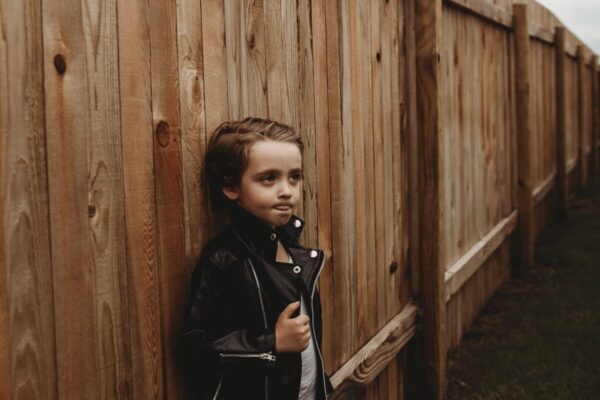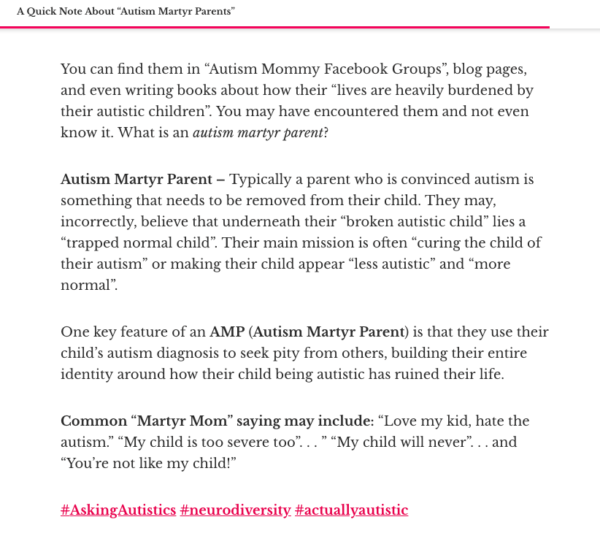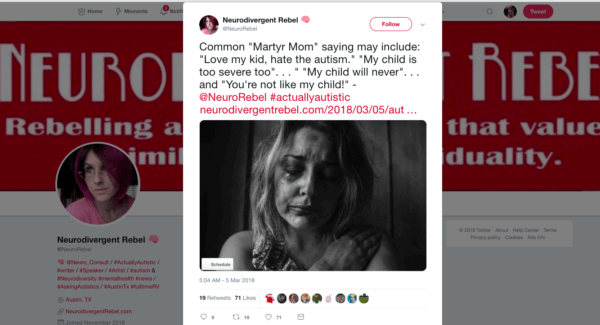What’s an autism martyr mom?
In the eyes of the #actuallyautistic community, an autism martyr mom is a mom who expresses negativity about autism and complains about how it has impacted her life. They believe autism moms are using their children to seek pity. See screenshots below.
The #actuallyautistic community, a group of autistic adults, likes to shame parents who express sadness about their children’s diagnosis. They come after me personally, too. (Hi guys!) One part of their platform is that only autistic people should be able to speak about autism because they are the ones living with it. They believe that parents of autistic children are furthering the belief that autistic people are less-than, as if being sad about your child’s inability to communicate or stay safe is incompatible with loving your child. I’m autistic but to them, I’m also a “martyr mom.”
Autism mom shaming
See this tweet above? This is the reaction we, parents of autistic children, get when we express any morsel of negativity about our children’s diagnosis. And you know what? I’m tired of it. I’m tired of the #actuallyautistic community contributing to what’s an already extremely difficult thing to do: being vulnerable. Autism does not only affect the person who has it. It affects everybody in the family unit.
You see that mom in the photo that the #actuallyautistic community is mocking as “martyr parent?” I’ve been her. I’ve hidden in the closet, and in my car, to cry my eyes out when I was scared. Just yesterday actually. Scared of what Charlie’s future will be like. Scared that he’ll end up putting himself in danger and that I won’t always be here to save him. Scared that he’ll never live an independent life. But also sad. Sad he can’t communicate beyond basic needs. Sad he screams hundreds of times a day and I can’t make it better. Sad for him, and yes, also for me.
I’ve been raising this wonderful human for almost 6 years and I’m longing to connect with him, to see him happy, to see him able to keep himself safe, to take care of himself in the most basic way, and to be able to give him a hug without being pushed away by his little hand. Maybe that makes me an autism martyr mom, but that also makes me human.
Sharing these difficult moments is not about seeking pity. It’s about sharing experiences with people who get it, it’s about connecting with other parents who live similar experiences so we don’t feel so alone. I often get messages from parents of autistic children who want to talk about autism but are terrified of being harassed by this community. That makes me sad.


Autism isn’t the same for everyone
And yes! You’re damn right my kid’s autism “isn’t the same as your autism”. An an autistic person, you should know that there are no two identical autistics. You speak from a place of privilege being high-functioning. I know first hand how incredibly hard living with an invisible disability is. I know because I, too, am autistic. But it’s not comparable to being severely autistic like my son, Charlie. To not being able to communicate beyond basic needs (not just talk but communicate!), use the bathroom independently, or to not know that running in front a car could get you killed. But you know what? I hope that one day Charlie will be high-functioning enough to tell me to fuck off and to stop whining about autism online. For now though, I’ll be his voice and advocate.
And I’m sorry. I’m sorry for not being that perfect mom that autistic adults expect me to be. I’m sorry I can’t smile and joke around at all times. But I’m not sorry for sometimes sharing our struggles with the world. I’m not sorry for making people feel understood in this journey as parents that can sometimes be so lonely and downright depressing. If reading my posts helps one parent of an autistic child then it was worth it. Signed, an actually autistic autism martyr mom.
I love you, Charlie. You are not less-than, and I hope you’ll grow up in a kinder world.







13 Comments
Tom
2018-12-04 at 3:57 PMEileen,
Je pense que tu te trompes car je n’ai pas le même recul que toi sur ce que tu vis.
Tu es une très bonne mère, tu as le droit d’être triste….il n’y a pas à être désolé ni honteux.
Tu n’as jamais profité de Charlie pour qu’on te plaigne. Tu partages seulement avec tous, parents d’autistes ou non, ton expérience et ton vécu. Qu’il y a t’il de mal à cela. ????
Ces gens ne ressemblent qu’à une secte, qui eux se prennent pour le Messie. Ils n’ont jamais réussi leur coming-out pour avouer qu’ils pouvaient être tristes et malheureux. Ce ne sont que des donneurs de leçons qui courent les rues avec un QI qui ne dépasse pas leur température rectale.
Il est plus facile de dire que tout va bien, plutôt que d’essayer d’analyser et comprendre comment on pourrait faire pour que cela aille mieux. Il n’y a aucune faiblesse à avouer son impuissance et son désarroi qui sont bien normales pour tout être humain. Ignore ces gens. Reste droit dans tes bottes car elles sont dignes, propres et pleines d’amour.
Je le répète IGNORE ces imbéciles qui ne comprennent rien à l’humanité.
Tu aimes Charlie, tu n’en profites pas. Charlie le sait bien, sois-en sûre.
Un cerveau d’autiste est bien plus intelligent que les cerveaux de ce genre d’individus.
Un jour Charlie te remerciera, j’en suis sûr.
Je t’embrasse ❤️
Sarah
2018-12-05 at 2:07 PMI just couldn’t agree with you more… And so, incidentally, does my high functioning 22 year old autistic son. Thank you for being brave enough for putting those thoughts in print.
Eileen
2018-12-05 at 6:43 PMI’m so happy to hear there are other autistic adults who agree with me. Thank you for taking the time to comment.
Brooks
2018-12-05 at 11:28 PMThis is so beautiful and heartbreaking! It can’t be easy to speak about these things. But it is so, so needed! If there is a parent out there that has an autistic child and HASN’T wished they could help, or that their child was higher functioning, I call bullshit. There’s a HUGE difference between wishing your child could care for themselves and demonizing autism. It’s so sad that everyone can’t just get along and realize we are all human with different experiences and diagnoses.
Eileen
2018-12-06 at 12:55 AMI couldn’t agree more. There is such a big difference between wanting your child to be able to care for himself and treating him as less-than because of its disability. Thanks for your comment! Always makes me happy to hear I’m not alone either to feel this way.
Jeannine
2018-12-12 at 12:13 AMYes, yes and YES! Autism doesn’t only impact my daughter, it impacts our whole family. Every intervention we’ve tried – every therapy we’ve done — it’s all been to help her toward self-sufficiency.
beele
2019-03-06 at 5:00 AMTough break, friend: These people are not a sympathetic bunch.
IDK how familiar you are with it but having come from Tumblr (where I’m 95% sure the #actuallyautistic hashtag originated from) I can tell you a lot of these #actuallyautistic people can be real whacks. They pretend low-functioning autism doesn’t exist, and some of them even straight-up demonize parents for trying to help their children become higher functioning OR even acknowledging that autism can be difficult to live with, especially if you’re a caretaker.
As you said, the people in this tag tend to be high-functioning; it’s also worth mentioning that many of them are teenagers and twenty-somethings (I’m sure there are older people, but those are the biggest demographics that I know of). They have habits and ticks that are cute, quirky, and harmless to themselves and others- and they insist that anyone who contradicts that narrative is “ableist”. They’ve done their best to build up this narrative that having autism makes them super-special (and for some of the extreme ones, better than everyone else) and they REALLY don’t like it when parents of autistic children poke holes in that narrative by pointing out the difficulties of raising a child who either has low-functioning autism OR symptoms that disrupt theirs and their family’s lives.
If they want to play that game then fine, but they have no business attacking you or any other parents for telling the truth of their lives. I suspect this lack of empathy maybe comes from the fact that, being younger and maybe not having kids yet, these #actuallyautistic people can only see the issue from their angle and not from yours (or any parents who may struggle).
Keep doing you, friend. Kudos to you for having the nugs to tell it like it is.
Eileen
2019-03-06 at 6:50 PMAlways makes me so happy to read comment like yours.
I agree with everything you said. I’m high-functioning and they hate me for describing myself as-is.
“Functioning labels are harmful blabla” – In my book, getting published this Spring, I talk about them.
Curious to see the response!
Amanda
2019-06-11 at 1:54 AMThank you for this. My autistic/adhd son has some very hard to deal with behaviours and I turned to the actually autistic hashtag to try and find some insights. I left feeling so much worse. It hurts and makes me scared for my son in the world because I know with supports he can live a happy healthy life. When I can’t even turn to the actually autistic community with my questions and concerns without being completely run into the mud it makes me feel hopeless. It makes me fear my child will hate me despite doing my best. I do not have an autism diagnosis, my husband however always comments on the similarities with my son and I. I do have an ADHD diagnosis and have sensory issues. I feel like it is a huge disservice to autistic children that we feel we can’t turn to the actually autistic community for real help with real problems. I will be looking more into your blog for whatever I can find.
Nobody
2020-06-20 at 9:04 AMYou should be aware that those with Autism have a higher chance of having Autistic children. So, it was your lifestyle choice that led you to your current life situation. What a great legacy! 🙂 Autistic parents love to be woe-is-me once they realise parenting is actually tough! No sympathy for you.
You should also be thankful that you had a boy, as they are more likely to be diagnosed with Autism. They’re usually more disruptive and get noticed earlier. The DSM-V criteria is based off the male white middle-class profile. Autism assessments ask dumb male-oriented questions like, do you like trains?
And please don’t give the whole ‘higher-functioning’ lecture, as that is incorrect. You should know this as an ‘Autistic’ person. I myself am classified as Level 2, even though I work full-time and am totally fantastic all-round. I had developmental delays, I didn’t speak until around age 6. I didn’t receive any intervention supports. I also had the wonderful experience of adverse childhood experiences (i.e. developmental/complex trauma). So privileged, right? I developed, in my own time, into this fantastic ‘high-functioning’ individual, as you call it.
There is a difference between Autistics with and without intellectual disability, you’re right. They’re less likely to be able to learn how to self-regulate OR learn how to pretend to be normal (masking/assimilation/compensatory behaviours). So, you need to realise that those without an intellectual disability have HIGHER expectations thrust upon them even when they have a Level 2 or 3 Autism diagnosis. They have to work harder than everyone else to get to the ‘same’ level. Do you work a full-time job around non-autistic people? Or are you an autistic person who thought they’d have a more comfortable time being a parent (while their partner works) and vlog?
You also have to understand that not all autistics have the same sensory profile (one of the subpoints under restrictive, repetitive patterns of behaviour). If your child is sensory seeking (hyposensitive), then they’re more likely to be outwardly disruptive and a screamer i.e. more behaviourally tougher to handle.
Coaching with EML
2023-07-07 at 3:53 AM@nobody Your reply reads as written by someone coming from a place of unresolved trauma; I am sorry you have had to deal with so much in the past, and perhaps this includes dealing with the difficulties you hint of regarding delayed diagnosis; misunderstanding, drive to conformity, not being able to access the curriculum due to lack of the appropriate support or accommodations etc. Your reply contains many contradictions and sounds very targeted and resentful, and full of hurt, coming from a place of limited personal experience as a child with autism. Your reply lacks self-awareness, empathy, the ability to view the situation from the perspective of another, is simplistic, and displaying difficulty in socio-emotional understanding. Maybe these are characteristics you have noticed you have struggled with before, or maybe you are unaware this is how your opinion comes across. The consequence is that your words are hurtful, probably similarly hurtful to how you have found misinformed opinions and accusations in the past. But two wrongs don’t make a right and you should perhaps question why you have written the elements of your reply designed to cause deliberate hurt and perhaps seek therapy in order to move on from your trauma. Some of these characteristics are typical of a person with autistic mind and so can’t be easily identified or learned and unlearned. But where we cause hurt to others we all have a duty to try to be aware of the impact of and to change our words and actions, where we have the capacity to do so. You are not treading on the right side of a line of advocacy; you’re calling for an unrealistic devotion from a parent with no sense of self or negative emotion, whilst wanting that parent to support, love, understand, advocate, pursue diagnosis, show unwavering emotional control and intelligence etc etc etc. Those two sides of the equation don’t marry.
Diagnosis, for example, doesn’t originate from a parent blindly unquestioning and accepting as to and of their child’s behaviour and difficulty. It usually comes from a place of all-consuming love and concern. Raising children is all-consuming, particularly if that child is ND or has SEN, and no-one can prepare a parent for just how tough that journey can be…especially for a parent that cares, and wants to be the best parent they can be; to help their child reach their potential and find their place in the world. Many if not most parents get it wrong at times. As do children. There is no manual and no two situations are the same. We are all learning for as long as we are alive. It is not right to deny any person forums for support, making a person feel guilty for being honest in expressing a situation is difficult or emotionally draining. Love and acceptance does not come without self-awareness and acceptance. Autistic or not, “high-functioning’ or not, you have a long journey ahead in your own acceptance of others and path to self-awareness and I wish you luck, because the further you are along that journey, the more content you will be, and the more positive influence the people you invite into your life will be.
#blingusspingus
2022-10-05 at 10:01 AMIt seems that you have a clear misunderstanding of what makes people upset about this kind of language, it’s sad honestly that you’ve blinded yourself to it in this way
Charlene
2023-02-28 at 9:11 PMSo pleased to read a blog post that I 100% agree with! And 100% relate too. It’s so incredibly infuriating the ‘autism community ‘